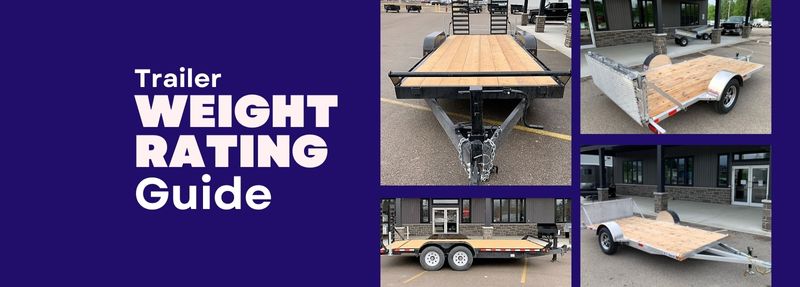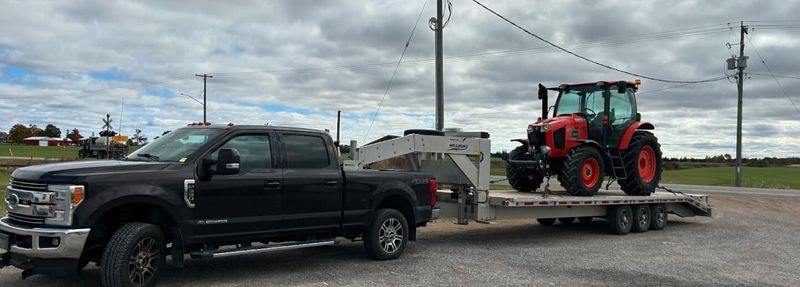Understanding Trailer Weight Ratings and Their Importance for Safe Towing
April 23, 2025 by Kyle McFarlane
Safe towing is all about understanding your trailer’s weight rating. These weight ratings are like a rulebook that tells you how much your trailer can handle without putting you, your vehicle, or others on the road at risk. When trailers are overloaded, it can lead to dangerous driving conditions, like poor braking, swaying, or even accidents. That’s why knowing your trailer’s limits and sticking to them is essential.
A trailer weight rating guide helps you figure out these limits so you can tow safely and avoid unnecessary stress. From how much your loaded trailer weighs to how well your vehicle can handle it, understanding towing capacity keeps you in control and ensures every trip goes smoothly. We’re here to talk about these key points and guide you through safe towing practices, so you feel confident with every haul.
Stick with us as we explain the key trailer weight ratings, why they’re so important, and how to calculate your towing capacity. We’ll also share some simple and practical tips to keep your towing stress-free. Whether you’re towing equipment or heading out for an adventure, our goal is to make sure you’re equipped for the road ahead!
Key Trailer Weight Ratings Explained
When it comes to towing, understanding key weight ratings is like learning the rules of a game—it helps everything run smoothly. Here are the main weight ratings you need to know, broken down in simple terms.
- Gross Vehicle Weight Rating (GVWR): This is the maximum weight your trailer can handle, including its own weight. Think of it as the absolute limit—going over this can damage your trailer or even make towing unsafe. Make sure to add up the trailer’s weight and your cargo to stay within the GVWR.
- Gross Trailer Weight (GTW): GTW is the total weight of your fully loaded trailer at a given moment. This number can change depending on how much cargo you’re carrying. Be careful not to guess this weight; instead, weigh your loaded trailer at a scale to ensure you’re in the safe zone.
- Tongue Weight (TW): This is the amount of weight that rests on the hitch of your towing vehicle. Too much or too little tongue weight can throw your balance off and make towing difficult or dangerous. A general rule is that tongue weight should be about 10-15% of your Gross Trailer Weight.
- Axle Weight Rating: The Axle Weight Rating tells you how much weight each axle of your trailer can handle. Exceeding this limit puts too much stress on your axles, which can lead to serious damage over time.
Understanding these ratings helps you make informed decisions, whether you’re choosing what to haul or selecting a trailer. If you’re unsure, our team at McFarlane Trailers is here to answer any questions and help you find the right trailer for your needs.
Why Trailer Weight Ratings Matter
Trailer weight ratings aren’t just numbers—they’re critical for keeping you, your vehicle, and your trailer safe. Overlooking these ratings can lead to avoidable problems on the road.
For starters, knowing weight limits can help prevent accidents caused by overloading. Extra weight puts stress on your brakes, tires, and suspension, making it harder to control your vehicle. Overloading can also cause your trailer to sway or tip over, especially when turning or in windy conditions.
Trailer weight ratings also protect your vehicle’s components. Brakes, tires, and suspension systems are only designed to handle so much. By staying within weight limits, you reduce wear and tear on these parts, which saves you money on repairs and keeps your vehicle running longer.
Lastly, sticking to weight ratings ensures better performance overall. You’ll enjoy better fuel efficiency (because your vehicle isn’t struggling to pull excessive weight) and a smoother, calmer towing experience.
No one wants a stressful drive or unexpected repairs, and following trailer weight ratings is an easy way to avoid both.
How to Find Your Towing Capacity
Understanding towing capacity is essential for planning any trip. If you’re unsure whether your vehicle and trailer are a good match, don’t worry—it’s easy to figure out with a little preparation. The first step is to grab your vehicle’s owner’s manual. Inside, you’ll find the maximum towing capacity for your make and model. This number is crucial because it tells you the total weight your vehicle can tow safely. It’s important to follow this limit to avoid putting extra strain on your vehicle, which can lead to damage or unsafe driving conditions.
Next, you’ll need to calculate the combined weight of your trailer and cargo. To do this accurately, load up your trailer just as you plan to take it on the road, then use a scale, such as one at a weighing station, to determine the total weight. Don’t forget to include everything you’re hauling—whether it’s tools, equipment, or your camping gear.
Once you’ve got the loaded weight, compare it to both your vehicle’s towing capacity and the Gross Vehicle Weight Rating (GVWR) of your trailer. Both numbers need to stay within their respective limits. If your total weight is over either one, it’s time to remove some cargo or reconsider your setup. Staying under these limits ensures a stress-free ride and protects both your trailer and vehicle.
Taking the time to check these details not only saves you frustration but also helps you tow with confidence.
Safe Towing Practices
Once your weight ratings are sorted, it’s time to focus on how you can safely tow your trailer. It’s not just about knowing what your rig can handle; it’s also about good towing habits.
- Distribute Weight Evenly: Make sure your cargo is balanced across the trailer. Uneven loads can shift while driving, making the trailer harder to steer or stop.
- Use the Right Hitch: Double-check that your hitch is strong enough to handle your trailer’s weight. Always secure the hitch properly and inspect it before every trip.
- Inspect Tires, Brakes, and LightsBefore you hit the road, take a few minutes to examine your trailer and vehicle. Check that the tires are in good condition and properly inflated, ensure the brakes are working, and confirm the lights and signals are functional.
- Drive Smart: Stick to posted speed limits and never rush while towing. Allow extra stopping distance, and remember that turning and braking take longer with a fully loaded trailer.
Applying these safe towing practices gives you peace of mind that your trip will go smoothly.
Your Partner for Safe and Reliable Towing
Knowing your trailer’s weight rating is the key to safe and efficient towing. By understanding these ratings and following a trailer weight rating guide, you can avoid overloading your vehicle and trailer, which helps ensure smoother trips and better driving conditions. Staying within these limits protects not only your equipment but also everyone on the road, giving you peace of mind as you travel.
At McFarlane Trailers in New Hamburg, Ontario, we’re here to make towing simple and stress-free. Our team specializes in trailers with clear weight ratings, so you can confidently choose the right option for your needs. Whether you’re new to towing or have years of experience, we’re happy to guide you through understanding towing capacity and practicing safe towing habits.
If you’re ready to learn more or need help selecting a trailer, we’re just a call away. Contact us today to find out how we can help you tow safely and confidently. With our trusted advice and high-quality trailers, you’ll be ready for whatever the road brings!



